Yemen crisis: An Iranian-Saudi battleground?
- Published
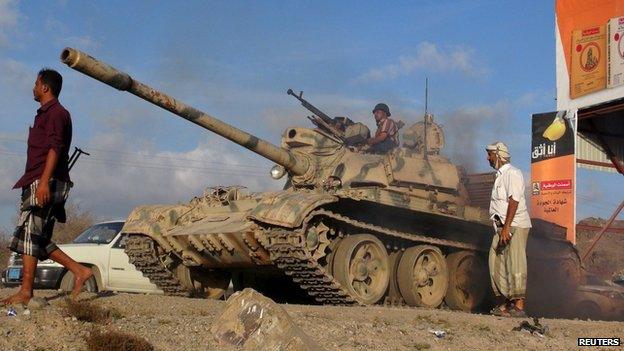
Soldiers and militiamen loyal to the president are battling Houthi rebel fighters advancing southwards
Yemen is fast descending into a violent cauldron where the competing interests of Shia Houthi rebels, Sunni tribes, Saudi Arabia and other Gulf Arab states, Iran, al-Qaeda and now Islamic State are forming a toxic mix.
The situation has got so bad that the US and UK have closed their embassies and evacuated their staff, while Gulf Arab countries have moved theirs to the southern city of Aden.
The Houthis are closing in on Aden, which controls the entrance to the Red Sea, the Bab al-Mandab strait, through which about 20,000 ships pass annually.
The city is also the base of President Abdrabbuh Mansour Hadi, who has called for military intervention by the Gulf Co-operation Council (GCC), including the imposition of a no-fly zone, while few people hold out much hope for the promised peace talks in Qatar.
So, is Yemen about to embroil the region in a wider war?
Sectarian strife
At its heart, the current conflict in Yemen is one between the rebels and what remains of the elected Yemeni government.
The Houthis are Shia, from the Zaidi sect. They are opposed not just by the government they have ousted but also by Yemen's many Sunni tribes.
But above all, they are opposed by the jihadists of al-Qaeda in the Arabian Peninsula (AQAP) and Islamic State, who consider Shia heretics.
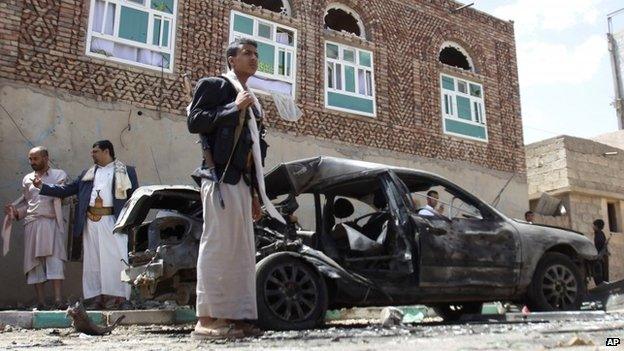
Islamic State said it was behind the suicide attacks on mosques in Sanaa used by Houthi supporters
On 20 March, IS marked its violent debut in the country with four suicide bomb attacks at mosques popular with Houthi supporters, killing more than 130 worshippers.
The Houthis come from the far north of Yemen and have little popular support in most of the rest of the country.
But they are effective fighters who seized the capital last September (having said they would not) and they are getting a lot of help from some quarters.
The powerful former President, Ali Abdullah Saleh, is widely reported to be backing them, determined to make Yemen ungovernable by his successor, the UN-backed President Hadi.
Iran is also alleged to be supporting the Houthis. The rebels officially deny this, but senior figures have been seen in Iran's holy city of Qom and there are unconfirmed reports of Iranian pilots flying Yemeni planes.
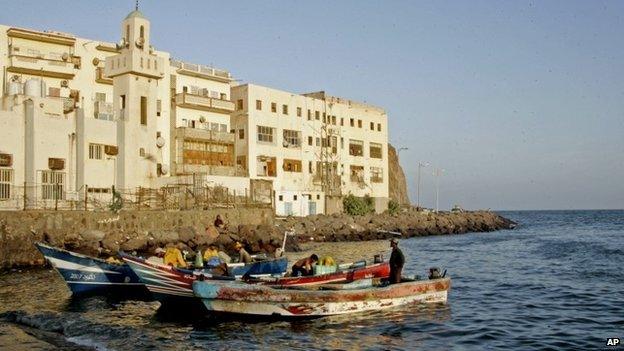
The southern port city of Aden controls access to the Bab al-Mandab strait and the Red Sea
All this is enough to seriously rattle the Saudis, who woke up too late to the prospect of a pro-Iranian rebel movement taking over their southern neighbour.
The Saudis, who conducted air strikes against the Houthis on their common border in 2010, say they will not allow Iran "to sow sectarian strife in the region" and have vowed to back Yemen's beleaguered president.
Saudi Arabia is still in the process of building a massive border fence with Yemen and is now bolstering its naval base at the southern Red Sea port of Jizan.
Proxy war fears
"The Saudi military preparation," says security analyst Aimen Deen from the think tank Five Dimensions, "signals, along with the increasing diplomatic efforts, Saudi Arabia's intent to stop the Houthis controlling the Bab al-Mandab strait.

"The pressing question is whether the Royal Saudi Air Force will intervene to prevent Aden from falling to the Houthis. All indications are that the Saudis are preparing militarily to answer this question, but the political decision is not yet taken."
Put bluntly, Yemen is in enough trouble with the ongoing fight between its own citizens.
If Saudi Arabia and other Gulf Arab states get drawn in one side, and Iran on another, the conflict risks getting exponentially worse.
"The looming danger is seeing Yemen merely as a proxy war between the Gulf Co-operation Council states and Iran," says Jon Altman, Middle East programme director at the Centre for Strategic & International Studies in Washington.
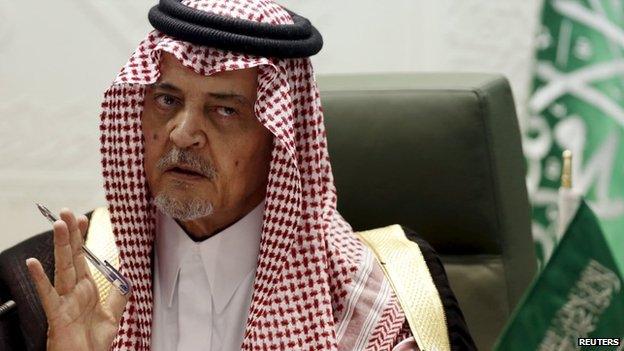
Saudi Arabia's Foreign Minister Saud al-Faisal has denounced what he called "the Houthi coup"
"Iran is clearly giving some support to the Houthis, but over the last 10 years that support has been limited and slow to arrive.
"There are no indications that the government of Iran sees Yemen as a strategic priority. If the proxy war route is pursued, the conflict is likely to rage for years."
'No exit strategy'
Yemen is no stranger to outside interference.
In the civil war of the 1960s, Egyptian President Gamal Abdul Nasser sent his country's air force to support the Republicans against the Royalists, dropping chemical weapons from the air.
Aden and its adjacent provinces were British protectorates until the British withdrawal in 1967.
South Yemen was then ruled by communists with Soviet backing, and the Russians established bases there.
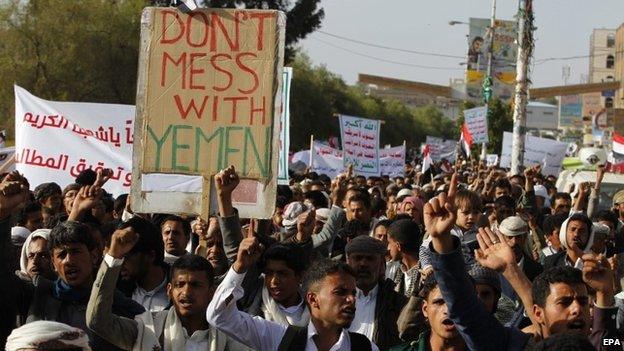
The Houthis and their supporters have warned against intervention by other Gulf Arab states and the US
In the civil war of 1994, Saudi Arabia allegedly supported the Southerners as they tried, unsuccessfully, to break away from the North.
And for the last 20 years, the US military has maintained a small and discreet military presence in the country, mostly training and advising on counter-terrorism, a presence which has now ended in an abrupt withdrawal after al-Qaeda fighters overran a town close to the base used by US Special Forces.
"The real danger of the civil war," says a senior Western official who asked not to be named, "is that of outside players getting involved."
But outside powers will be thinking carefully before committing themselves to military intervention in Yemen.
It is an expensive, difficult country for anyone to wage war in, the battle lines are blurred and there is no clear exit strategy for either side.